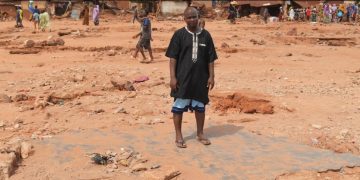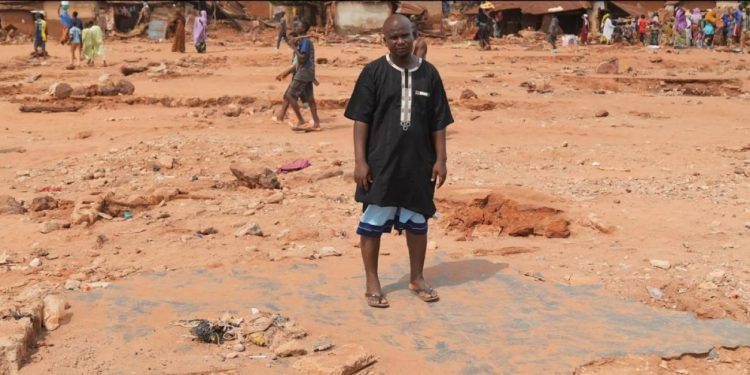Adamu Yusuf’s life changed forever when severe floods swept through his hometown of Mokwa in Niger State, claiming the lives of nine of his family members. His community, Tiffin Maza, was one of the two hardest-hit areas, alongside Anguwan Hausawa.
The 36-year-old father recalled being woken up by his wife in the early hours of Thursday, just as the water began to enter their home. Acting quickly, he gathered his family and urged them to stay close together.
“When we stepped outside, we saw water flooding our living room and compound. Everyone panicked, and we got separated,” he told the BBC.
Tragically, his wife and their newborn baby were among those swept away. She had only just returned from her parents’ home the day before, after spending a few weeks there following childbirth.
“I watched helplessly as the water carried my family away,” he said. “I survived because I could swim. It was only by God’s grace.”
By Saturday, the National Emergency Management Agency (NEMA) confirmed 151 deaths. By Sunday, local officials reported that the number had exceeded 200.
Standing on the few remaining tiles that once marked his bedroom floor, Adamu surveyed the ruins of what used to be his home. “I lost everything,” he said. “But losing my family is the most painful part.” The only possession he had left was a piece of clothing given to him by a friend.
So far, only one of his relatives has been found, and he fears the others may never be recovered.
Nineteen-year-old Isa Muhammed, a recent high school graduate, is also mourning. His teacher’s house was destroyed, with the teacher and eight family members inside.
“Two bodies have been recovered, including his baby,” Isa said. “His wife was killed instantly when a building collapsed on her. The rest are still missing.”
Isa also lost his uncle, who had raised him since his father died in 2023.
As the floodwaters receded, residents gathered on Saturday to console survivors and join search and recovery efforts. In some parts of the community, water levels reached up to seven feet.
A strong, unpleasant odor now hangs in the air in Tiffin Maza, which many believe is due to bodies still trapped beneath the thick mud left by the flood. Locals are determined to recover every victim and provide proper burials, as they have been doing since Thursday.
Ramat Sulaiman, 65, lost her home and is now homeless along with her family. She shared the heartbreaking story of a Quranic school near her house where about 100 children were sleeping.
“They all got washed away,” she said. “The children were crying for help, but no one could reach them. Their cries grew louder, and then the building collapsed and was swept away.”
There is growing suspicion that the floods were not caused solely by heavy rain. Many residents believe the disaster may have resulted from the release of water from the Kainji Dam.
“This wasn’t caused by rain,” said Isa. “The rain had already stopped. Suddenly, water came rushing in at high speed, destroying everything.”
Mokwa Deputy Local Government Chairman, Musa Alhaji Aliyu Kimboku, also dismissed the idea that the flood resulted from rainfall.
According to SaharaReporters, several victims claimed the disaster occurred after water was released from the dam. Residents told reporters that the flood hit suddenly in the early hours of May 29, without any significant rainfall the night before.
They also noted signs in the days leading up to the flood, including minor flooding in New Bussa town in Borgu Local Government Area and rising water levels in farmlands around Mokwa.
AbdulGafar, another victim who lost all his belongings, is convinced the flooding was not natural.
“If this was from rain, it would have come gradually or during the night,” he said. “This was sudden and overwhelming. We’ve never seen anything like this.”
He acknowledged that the area has faced erosion problems in the past, but nothing compared to the recent destruction.
“This is the worst we’ve ever experienced. It wasn’t rain—it was a massive surge of water, possibly from the Kainji Dam.”
Another resident, Salihu Suleiman, who lost his home and investments, echoed that sentiment.
“There was no heavy rainfall the day before,” he said. “Around 6 a.m., my wife and I woke up for morning prayers. After praying, we went back to sleep. Minutes later, my mother knocked on our door, yelling that water was coming. I woke my wife, and we ran out immediately. I didn’t even have time to grab anything—not even my phone. I escaped wearing only my singlet and boxers.”
As recovery efforts continue, the community is left grappling with loss, uncertainty, and questions about what really caused the flood that changed their lives forever.















